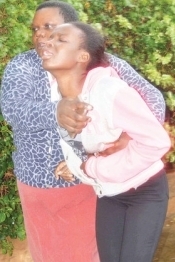
Aboluganda nga balumwa okufiirwa abantu baabwe
BAKASITOMA ba wooteeri ya Namirembe Guest House bakubiddwa ekisenge, babiri ne bafiirawo:
10 June, 2016
By Nelson Wesonga, Kampala

Government says it does not have records of pensioners due to “lack of data and personal files.”
According to the ministry of Public Service, many pensioners do not show up for verification thus leading to delays in payment of their monthly dues and the once off gratuity.
The State minister for Public Service, Mr David Karubanga told MPs during plenary that the ministry will, carry out a census and biometric validation of pensioners starting February 20.
“The ministry of Public Service does not have a national register of pensioners,” Mr Karubanga said yesterday.
“Despite the decentralisation of pension management, a number of votes [ministries] have not verified the records on the payroll.”
A day earlier, Aruu Member of Parliament, Odonga Otto had told the August House that many pensioners have not been paid for several months.
Many were, therefore, depending on their relatives – who already have other financial responsibilities – to pay their bills or to buy basics.
Those without relatives are borrowing items from shopkeepers.
Shopkeepers though can only lend them for a few months expecting to be paid once they get their gratuity.
Following Mr Odonga’s remarks, the Speaker of Parliament, Rebecca Kadaga said the government was treating the senior citizens disrespectfully.
On Wednesday, Mr Karubanga also said the Public Service ministry had for the last four years not carried out verification of pensioners “due to funding shortage and lack of clear addresses" [of the pensioners].
The verification of the pensioners will be done between February 20 and March 24 at the district headquarters by Face Technologies.
According to Mr Karubanga, Face Technologies will do the work, which the ministry failed.
However, it is still not clear how much the ministry will pay the company.
Face Technologies is the company that processes driving permits for motorists.
Workers Members of Parliament Margaret Rwabushaija and the Erute Member of Parliament Jonathan Odur said the government should tell Ugandans when it would pay the pensioners all their arrears.
Mr Karubanga said payments are the responsibility of the Finance ministry.
All that Public Service does is to furnish the Finance ministry with the particulars of the claimants.
Posted 29 September, 2014
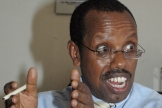
The Secretary to the Treasury, Mr Keith Muhakanizi who kept calling himself “ born again Christian” was today pushed on the wall and forced to apologise for the “inefficiencies” in the running of a Shs 90 billion facility meant for helping the poor farmers access cheap credit.
The Parliament’s Public Accounts Committee noted “gross inefficiencies, conflict of interest and lack of supervision of the funds” on the part of Bank of Uganda and Ministry of Finance. Because of lack of supervision, PAC Chairperson Ms Alice Alaso said, the money has gone to the well-off farmers at the expense of the poor farmers and written off more than Shs499 million in bad debts.
On December 3 2009, the Governor Bank of Uganda Prof Emmanuel Mutebile wrote to Ministry of Finance, saying that Bank of Uganda could not monitor the implementation and evaluation of the facility, citing conflict of interest however to date, Mr Muhakanizi had not taken action. The ST apologised for “inefficiency” saying “he is also human”.
The committee expressed concerns about the possible risk to the funds and ordered Muhakanizi to streamline the monitoring of the scheme within one month. Officials from BoU told the committee that they signed a Memorandum of Understanding with Ministry of Finance and clearly STATED that monitoring of the agriculture
credit facility will not be their mandate.
Mr Muhakanizi returns to PAC next week.
But The suffering goes on without any social welfare in this poor African country:
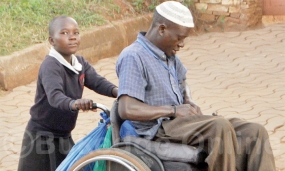
Nakasango nga asindika kitawe bagende okusabiriza ssente.
Taata Omusoga ava e Iganga ate nga mulema oluusi antuma okumugulira bamalaaya wano mu Kampala:
By Lawrence Kitatta
Added 21st September 2016
Nakasango anyumya bw’ati:
Nzuukuka ku makya ng’obudde tebunnakya ne tutegula ebikunta oluvannyuma taata bw’aba yeetewuulizzaako mu kaveera nkakwata ne nkasuula mu kipipa kya Kcca ekiri e busukkakkubo. kyokka oluguudo ndusala mmagamaga emmotoka zireme kunkoona.
Bwe tuba twasuze n’amazzi tunaabako mu maaso era tunywako oluusi ne njolekera Kiswa gye nsoma mu P1.
Taata eyandibadde ampa ssente za bodaboda okuntwala ku ssomero ate nze mba nnina okumusindika ku kagaali nga tuva e Lugogo we tusula ku mulyango gwa GTZ.
Olumu ku ssomero anzigyayo ssaawa 4:00 ne tugenda ku kkubo gye tusabiriza. Olumu nsoma naye olulala nnemererwa.
Olusoma oluwedde nakola ebibuuzo era okuva olwo saaddayo kusoma. Buli lunaku tuzunga ekibuga kumpi okukimalako ne mpulira nga n’obugere bunfuuyirira.
Kasango ng’azingako akaveera akakola nga bulangiti e Lugogo okumpi ne siteegi ya New Vision, we basula ate Nakasango nga yeetereza batandike olugendo lw’okubuna ekibuga nga basabiriza.
Naye taata bw’atuuka ku kaserengeto olwo ng’anteeka mu maaso ng’akagaali kayiringita. Taata yangamba nti maama wange ye Nasim Namulondo abeera Iganga era gye yanzigya okundeeta e Kampala okutandika okusabiriza ku luguudo.
Enkuba bw’etonnya mu budde obw’ekiro olwo ne tuyimirira ku lubalaza we tusula olumu n’okutukuba etukuba naddala ng’erimu kibuyaga.
Obudde buli lwe buziba mba mu kweraliikirira. Taata oyo talina nsonyi antuma okumuyitira bamalaaya ekiro!
Omanyi bwe tuba twebase nsula ku ludda kw’assa ebigere wabula olumu ngenda okusisimuka nga mpulira anninnya mu maaso, ngenda okulaba nga mukazi.
Olumu mpulira n’amaloboozi ekiro naye nga sirina kyakukola. Bw’aleeta bamalaaya nga sinneebaka olwo nsituka busitusi ne ntuula ku kkubo mu kayumba ka siteegi ya New Vision okutuusa lwe bamaliriza naye ate olumu nneekanga nsuze awo. Olumu antuma e Nakawa ngule sooda.
Wano nga beetegeka okugenda.
TAATA YANZIBA AWAKA
Bwe yali yaakandeeta okunzigya mu kyalo ng’annyambaza nnyo engoye z’abalenzi nga tayagala bamulaba kumanya nti ndi muwala naye kati nange nnyambala ngoye z’abawala.
Nzijukira nali mbeera ne maama wange ne jjajja, twali tuzannya ne baganda bange be twabeeranga nabo awaka, abakulu tebaaliwo kw’olwo taata yajja awaka n’anzibawo n’antwala ewa jjajja omulala.
Ono kirabika ye maama we amuzaala wabula nga naye saamwetegereza bulungi era simumanyi. Taata bwe yawulira nti gye yanzigya baali batandise okunnoonya kwe kunzigyayo n’andeeta e Kampala.
Kye nzijukira twatuuka kiro era ekkubo eryatuleeta sirimanyi naye angamba nti ewaffe Iganga we wali ekyalo kyaffe.
Wabula okuva lwe natandika okubeera ne taata embeera tebeerangako nnyangu kuba ennaku ezisinga tusiibirira capati n’amazzi emmere tugirya lumu na lumu ate tugirya Kataza Bugoloobi kuba we wali eya layisi gy’asobola okugula.
Eno ku 1500/- tufuna ebijanjaalo n’akawunga ate ennyama ya 3,000/- naye ennyama emirundi gye nnaakagiryako mbala mibale ate essowaani tugigabana.
Added 6th June 2019
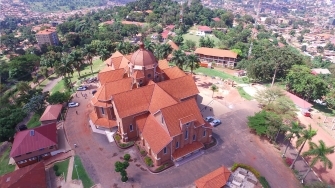
The famous Anglican Cathedral on top of Namirembe Hill.

Aboluganda nga balumwa okufiirwa abantu baabwe
BAKASITOMA ba wooteeri ya Namirembe Guest House bakubiddwa ekisenge, babiri ne bafiirawo:
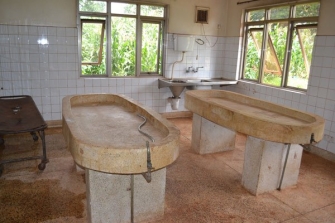
Limited space, lack of refrigeration services as well as poor standard tables for postmortem and laboratories for testing specimens pose great challenges to the efficient running of the morgues.
Other challenges include inadequate personnel to man the buildings and rooms where dead bodies are kept before burial or cremation.
In the countryside, there are no streetlights on the roads or pathways leading to the dilapidated morgues and at night, mortuary assistants or undertakers wheeling the bodies to and from the buildings are guided by only torchlight.
Sometimes, when a major accidents occurs and there are several casualties, bodies are piled one on top of the other.
And often, corpses need to be kept for several days because of delays occasioned by formalities from the police.
In such cases, the bodies are left to waste away, leaving postmortem examinations to be conducted with huge stress. For preservation of the bodies, the essential air-conditioning and an ice cube chamber are lacking.
Lira Hospital mortuary, which receives on average seven bodies on a daily basis, does not have a refrigerator.
While the mortuary at Sembabule Health Center IV, which acts as the district hospital, is more or less disused and has no door.
In 2016, some unknown people took advantage of a power blackout in Sembabule District, kidnapped a patient from the ward and hid him in the mortuary.
But Ms Joelia Mukabalisa, the Sembabule District secretary for Health and Education, now says they have mobilised funds to renovate the mortuary.
Similarly, the Bududa Hospital mortuary, like most mortuaries in the country, has no refrigeration services and one is greeted by a knockout stench whenever one dares the no-go area to pick up the remains of a loved one.
Dr Sylivia Ntegeka, the Bududa Hospital superintendent, says the mortuary at Bududa Hospital does not have a refrigerator for preserving dead bodies.
“The mortuary is too small to accommodate more than five bodies but when the facility is overwhelmed, some of the bodies are transferred to Mbale Hospital mortuary for further management,” she says.
“Despite the fact that a small percentage of the hospital budget is allotted to run the mortuary, it is rather meagre to effectively address some of these challenges,” she adds.
In Hoima Municipality, the mortuary looks abandoned while its satellite facilities upcountry has bodies rotting away.
The hospital authorities say in most cases, relatives of deceased end up traumatised and in tears and shock upon seeing the bodies of their beloved ones in such sorry condition.
In October 2018, about 15 unclaimed bodies were piled up at Moroto Hospital mortuary before the remains were collected by Moroto Municipal Council authorities for burial in a public cemetery.
Dr Alfred Ogwang, the Moroto Hospital director, says the facility does not have any piece of land to be used for the burial of unclaimed bodies.
“The irritating smell out of the mortuary is disturbing and affecting some of the nearby restaurants in the town,” he says.
At Atutur Hospital in Kumi District, the situation is not any different. The mortuary at this government hospital on the Soroti-Mbale highway is operating without a refrigerator.
Ms Stella Alupo, the hospital administrator, says the mortuary which serves Bukedea, Kumi, and Ngora districts and parts of Serere, also suffers space constraint.
“When bodies that are dropped in take long to be claimed by the relatives, it leaves the hospital with a bad stench,” she explains.
Ms Alupo also says the morgue lacks qualified technicians, calling upon government to train qualified mortuary attendants to handle mortuary duties.
“To have standard mortuary, the government must expand space; provide power, deep refrigerators, water, cupboards for storing dead bodies and train morgue attendants,” she says.
The mortuary at Mbale Hospital has a capacity to handle less than two bodies. However, it has four trained technicians manning this facility, Dr Emmanuel Tugaineyo Ituuza, the hospital director, says.
Also, the mortuary at Soroti Hospital lacks the much needed components to meet the desired standards for proper preservation of dead bodies.
The Soroti Hospital director, Dr Francis Mulwanyi, confirms: “It’s a challenge, our mortuary services are affected by limited space and the refrigeration system that has a maximum capacity to preserve [only] two dead bodies.”
Meanwhile, Masaka Hospital does not have its own mortuary and has since been relying on Masaka Municipality mortuary, which is adjacent to the hospital. But Mr Edward Kabuye, the hospital principal administrator, says: “We are happy to report that this financial year, we shall acquire a modern mortuary fridge, which will help us to keep bodies in good shape,” he says.
Fort Portal hospital has a modern mortuary that can accommodate about 50 bodies but the mortuary is ill-equipped. The mortuary has one cooler, which accommodates only three bodies and sometimes it does not work.
The hospital serves the Rwenzori region which includes Kabarole, Kamwenge, Kyenjojo, Kasese, Bundibugyo, Ntoroko, Bunyangabu, Kyegegwa districts.
The officer in charge of the mortuary, Mr David Ndikumwami, says they have no chemicals to treat bodies and that the one cooler is inadequate for the hospital that serves at least eight districts.
Mr Ndikumwami says in case of overflow, they use Fort Portal Municipal mortuary which accommodates about 20 bodies.
“Since the mortuary is not well equipped, people who lose their loved ones and their bodies are taken to the mortuary are made to pay some money in order for the bodies to be treated,” Mr Ndikumwami says.
In northern Uganda, Gulu Hospital mortuary accommodates eight bodies but the unclaimed bodies are normally kept at the facility for over month.
“At times police also dump bodies at the facility and there are no follow-ups on the matter,” the senior hospital administrator, Mr Paul Ajuk, says.
Atiak Health Centre IV in Amuru District does not have a mortuary. The district health officer, Dr Patrick Odong Olwedo, says: “We use a small building which is supposed to be a theatre. In most cases, whoever loses a beloved one, the body is picked up immediately since we have no better provision to keep the bodies at the facility.”
He, however, says plans are underway to have a mortuary.
In the entire Agago District, there is no mortuary.
“At times bodies are taken to Dr Ambrosoli Memorial Hospital in Kalongo whenever the need arises,” Dr Emmanuel Otoo, the district health officer, says.
In Moyo District, the refrigerator at Moyo Hospital has broken down, rendering its mortuary non-functional.
Mr Bernard Besi, the senior hospital administrator, confirmed the mortuary had not been operational for two weeks by the time of filing this report.
“It is true, our refrigerator is faulty and we have already informed the regional mechanical workshop that is responsible for repair and maintenance of medical equipment. They told us they would come to put it right,” Mr Besi said on November 10.
At Arua hospital, the mortuary is functional with minimal challenges, according to the hospital administration. Bodies there are treated and kept, especially for those whose relatives have a not shown up to claim the bodies.
Mr Rajab Kito, the Jinja municipality public relation officer, says Jinja Municipal Council does not also have mortuary.
Jinja Regional Referral Hospital administrator, Mr Mubaraka Were, says bodies of accident victims, bodies recovered from water and dumped in bushes or sugarcane plantations are some of the challenges facing the hospital.
Nakaseke Hospital mortuary was only recently rehabilitated by the government under a Shs5 billion Health Sector Support Project. The money for the renovation of the hospital was a loan secured from World Bank.
The mortuary has a fridge with the capacity of storing nine bodies at one go, the hospital senior administrator, Mr Ntumwa Matovu, says.
But the frequent power outages due to a faulty transformer is a huge challenge currently facing the facility.
“When we do not have electricity to power the fridge system, the hospital faces a challenge of storing the bodies,” Mr Ntumwa says.
OTHER AREAS
Kabale. In Kabale District, the issue of personnel has remained a stressing challenge. For instance, Kabale Hospital has a complete mortuary manned by two qualified mortuary attendants, Dr Sophie Namasopo, the hospital director, says.
“Our mortuary has one fridge that can preserve three bodies at ago. However, one of the challenges here is the delay to pick up unidentified bodies,” Dr Namasopo says.
She adds the unidentified and unclaimed bodies are always handed over to Kabale Municipal Council authorities for burial in the cemetery.
Kisoro. The Kisoro Hospital medical superintendent, Dr Michael Baganizi, says their mortuary lacks a refrigerator for storing dead bodies.
“In cases of unidentified and unclaimed bodies, the hospital administration hands them over to the municipal council authorities for burial in the cemetery,” Dr Baganizi says.
Nakasongola. The mortuary at Nakasongola Health Centre IV is in good state and has a functioning fridge. The fridge has a capacity of storing six bodies at once, Mr Agaba Byamukama, the District health officer, says.
Compiled by:
Bill Oketch, Steven Ariong, Scovin Iceta, Felix Warom, Robert Muhereza, Denis Edema, Cissy Makumbi, Cissy Ejang, Isaac Newton Abili, Mudangha Kolyangha, George Emuron, Dan Wandera, Scovia Atuhaire, Olivier Mukaaya & Moses Muwulya.